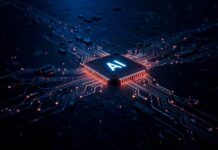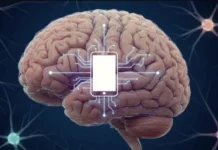AI-Powered Quantum Computing: Technology is changing at an unprecedented rate in 2025. Each week, a new app, a groundbreaking device, or a wiser algorithm emerges. But two technologies are leading the pack — Artificial Intelligence (AI) and Quantum Computing. Individually, they’ve already transformed our lives. Combined, they’re poised to transform the future of everything from medicine to security.
How AI-Powered Quantum Computing Is Revolutionising Technology in 2025
And while this may sound like something straight out of a sci-fi movie, it’s already underway — quietly, rapidly, and deeply.
What Exactly is AI-Powered Quantum Computing?
Let’s demystify. We already know what AI is — computers that can learn, reason, and decide like (or even better than) humans. Consider your personal assistant, your tailored Netflix recommendations, or autonomous vehicles. These are all based on AI.
Then comes quantum computing, a whole new form of computing. In contrast to standard computers that work on information in bits (0s and 1s), quantum computers operate on qubits that can exist in many states simultaneously.
That is, quantum computers can make complex computations at super-duper speeds, solving such problems as would take today’s supercomputers thousands of years.
Now, picture combining AI and quantum computing power. You have machines that learn in a flash, but in addition, solve the toughest problems faster than ever. That’s quantum computing powered by AI — and it’s not a theory anymore. It’s here.
Real-Life Examples: Where the Magic Is Happening
1. Healthcare: Curing Diseases Faster
One of the most thrilling breakthroughs is in medicine. Discovering a cure for diseases such as cancer, Alzheimer’s, or even the next pandemic virus takes years, decades at times.
But with quantum computing, researchers can model how drugs will affect human cells at the atomic level. AI then uses that to predict which combinations are likely to succeed.
What used to take 10 years can now be done in weeks. In 2025, some biotech startups are already employing these systems to accelerate vaccine development and drug screening.
2. Finance: Smarter Investment with Lower Risk
Financial markets are complicated and volatile. Conventional AI already assists banks in making wiser investments, preventing fraud, and regulating risk. But with quantum computing, they can now process millions of financial situations simultaneously.
Envision a portfolio manager who can execute thousands of “what-if” simulations at the snap of a finger. That’s what quantum-powered AI is accomplishing for investment banks and hedge funds.
It’s not merely about generating more money — it’s about creating better, safer decisions with fewer errors and trials.
3. Cybersecurity: Combating Hackers with Quantum Intelligence
Cybersecurity isn’t just about securing passwords anymore. It’s about securing entire digital networks — from the power grid in a country to medical records.
In 2025, quantum hackers are a definite danger, able to penetrate even the most secure encryption.
But here’s the catch — so is the solution. Quantum systems that are fueled by AI can create encryption algorithms that are virtually hack-proof and identify cyberattacks in real time. Governments and corporations are already leveraging this technology to remain one step ahead of cyber-terrorists.
4. Climate Science: Forecasting and Shielding the World
Climate change is one of the largest challenges facing our planet today. Researchers use enormous amounts of information to simulate the Earth’s climate, forecast natural disasters, and investigate clean energy sources. Computers can only do so much.
Quantum-AI computers can crunch climate models at a whole new scale. They can model weather patterns, forecast natural disasters, and maximise energy usage, enabling humanity to react faster and wiser to the changes in the environment. It’s not a tool anymore — it’s a potential lifeline for the world.
Big Tech Is Going All-In
Some of the largest technology players in the world are investing billions in AI research based on quantum. Google, IBM, Microsoft, and startup companies such as Rigetti and IonQ are at the forefront.
Google’s Sycamore 2 processor set a record in 2025 by solving an issue 10 million times quicker than the top supercomputer.
IBM announced a Quantum Cloud AI Service that enables developers to execute quantum-boosted AI applications directly from their web browsers.
Microsoft launched Azure Quantum + Copilot, merging natural language AI and quantum simulations, making it possible for researchers to “speak” to quantum algorithms.
These firms aren’t tinkerers. They’re building the foundation for the next computing revolution.
The Human Side: What This Means for Us
All of this sounds awesome — and perhaps even scary. But what does it mean for regular people?
It means faster medical treatments, smarter financial tools, more secure personal data, and better decisions about our environment.
It means students learning on adaptive quantum-AI platforms. It means engineers are designing safer buildings. It even means artists creating music or paintings with the help of intelligent machines.
We’re not being replaced. We’re being amplified.
Quantum computing doesn’t steal jobs — it changes them. It opens up doors to innovation and symbiosis between machine intelligence and human ingenuity.
But Wait — There Are Challenges, Too
As wonderful as all of this sounds, quantum computing remains a long way off. These computers are fragile, pricey, and difficult to manufacture.
They need cryogenic cooling and high error rates. Educating individuals to use them is also a major stumbling block.
Then there is the issue of ethics. How do we make sure that these are used responsibly? Who holds the data? How do we avoid misuse in war or spying?
These are big questions requiring careful answers, and they need to happen quickly. As we enter this new world, regulations and ethics need to keep pace with the technology.
Looking Ahead
By the decade’s end, experts believe quantum-AI systems will be part of everyday life. They’ll assist in operating smart cities, navigate self-driving cars, and diagnose serious medical conditions. They’ll be within our homes, our schools, and even our entertainment systems.
But 2025 marks the tipping point — the year that AI and quantum computing transitioned from the lab to reality.
This is the moment to learn, adapt, and be a part of the change. Whether you’re a student, a business owner, a developer, or just a curious mind, the quantum-AI revolution is knocking. And it’s not just for techies anymore.
Read also israeli soldiers abusing a Palestinian man
Final Thoughts
We’re witnessing a once-in-a-century leap in technology — and it’s happening in our time. AI-powered quantum computing isn’t just transforming industries. It’s redefining what’s possible. Follow us on Facebook.
As we proceed into 2025, one thing stands clear: the future is for those who know and adopt this change. Are you ready?



























